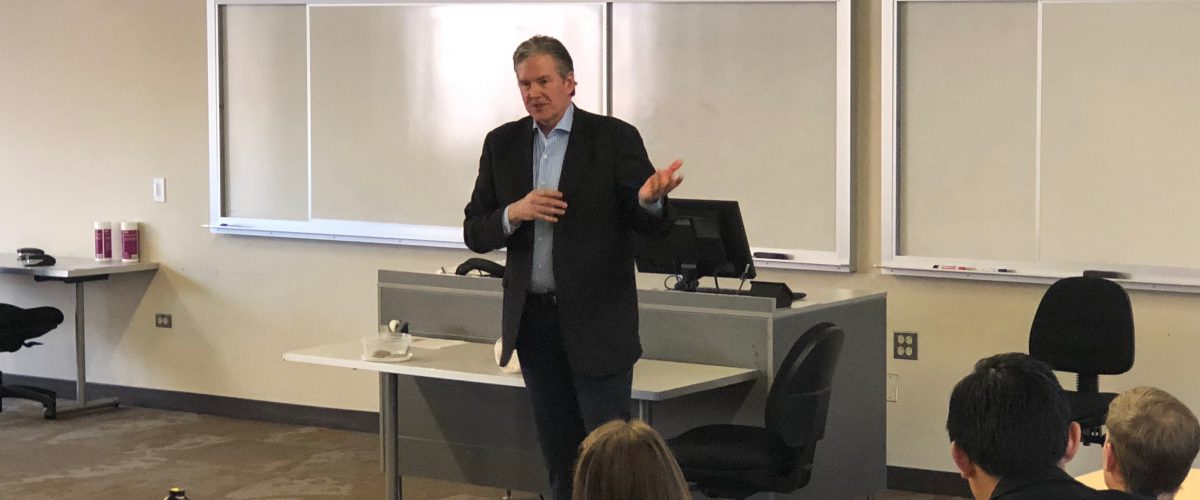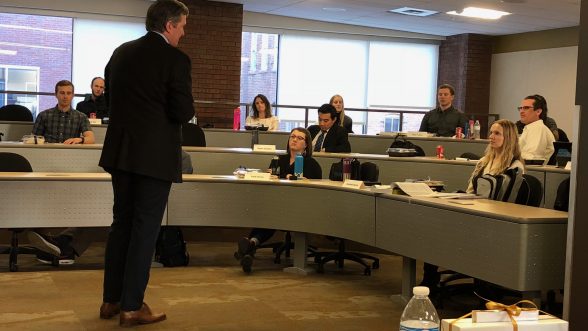
In the MBA program at the CU Denver Business School, students have opportunities to hear from influential business leaders. As a leading executive at a multi-billion dollar company, Nest CFO Jim Buckley was recently invited to speak about his business career and offer advice.
An unexpected path to CFO
Buckley inadvertently took a windy road to get to where he is today. He spent time explaining his various roles at both small businesses and large corporations like Motorola, Verecloud, and Qwest Communications. He shared stories about complex ethical dilemmas he’s experienced, as well as his transitions between companies.
Buckley started his career at Fortune 500 companies, before shifting into small business ventures.
Looking back, his career path may appear nontraditional. Buckley started his career at Fortune 500 companies, before shifting into small business ventures.
Miguel Arguelles, MBA student, commented, “I initially thought to have a higher-ranking position in a large company required an equivalent position in another large company. It surprised me to hear he worked for many smaller businesses later on in his career.”
Buckley alluded that it was because of his experience at these small ventures that Google noticed him and hired him on to head finance at Nest.

What working at a Google company looks like
Nest is a company known for being at the forefront of the internet of things trend back in 2011 with its smart thermostat. Since then, it has grown to become an all-encompassing home automation system that is programmable, self-learning, and sensor-driven.
Not surprisingly, the company also integrates technology in its offices. Nest is a great example of one of the many tech companies known for its quirky work culture.
One of the most radical changes to workplace culture was the idea to give employees 20 percent of their time to work on whatever project they wanted.
Buckley relayed his experience as a part of Nest’s progressive work culture. He painted a picture of an open workspace with no offices that remove any sense of hierarchy. Even printing is considered outdated. He lightheartedly shared one of his personal goals was to never print a single piece of paper while working at Nest.
One of the most radical changes to workplace culture was the idea to give employees 20 percent of their time to work on whatever project they wanted. This idea injects innovation by allowing employees engage their strengths and figure out solutions to problems without restrictions.
Buckley also noted that collaboration plays a large role in the structure of the day-to-day activities, because most work ends up being done in conference rooms.
Buckley admits that this culture was an adjustment. He was used to a more traditional culture reflecting a stricter hierarchy. Now at Nest he feels that employees are much more empowered by their supervisors to make their own decisions on projects and timelines.
A workplace for the employees, by the employees
The trend of the workplace has been shifting to become more employee driven. Nest does this very well by providing unique benefits that were unheard of a decade ago. What Buckley emphasized was the monetary return on investment Nest sees in providing these services.
For example, Nest provides free lunches and transportation to all workers through buses. The result? Employees are now answering emails on their morning commute instead of sitting in traffic and being more productive during lunch.
Naysayers have come out in saying these benefits are taken to the extreme. Addressing these concerns, Buckley said, “At the end of the day, there’s been studies that show that a free lunch provided by the company pays for itself in ten minutes. People don’t leave the building. They have meetings during lunch. They work later into the day.” Companies are seeing that quantity and quality of work their employees are producing outweighs the cost.
“At the end of the day, there’s been studies that show that a free lunch provided by the company pays for itself in ten minutes.” – Jim Buckley
Buckley also highlighted the importance of feedback in the workplace. “Everything is employee driven. Everything is about feedback.”
He shared that the culture at Nest relies heavily on surveys, maybe even a little too much. He joked that no matter the meeting, you would probably receive a survey from the organizer about the value of the meeting.
Lasting words of wisdom
When answering questions from students in the classroom, Buckley spoke on how to find the right company for you. Specifically, he stressed the importance of finding the right job with the right people.
Focusing on the business is important, but it is equally important to focus on the people who are running that business. He gave a list of important questions anyone should ask themselves about the company throughout the job search and hiring process:
- Do they have integrity?
- Are they honest?
- Are they smart?
- Do they have a good vision for the future?
He advised that anyone should focus on the compatibility of the relationships from those you will be working with. That way you are more likely to be happy.
His last bit of advice was applicable to anyone, no matter if you are in the job search or employed full time. Open up your mind beyond your perspective. Putting yourself in the other person’s position as much as possible improves your success.
Open up your mind beyond your perspective. Putting yourself in the other person’s position as much as possible improves your success.
No matter if you are going into a meeting, interview, or presentation, you should try not to think so much about what you want to say and how you want to say it. Rather try to think about what you would want to hear if you were on the other side.
The CU Denver Business School partners with business leaders and companies to provide the best education and practical experience for our students. With over 300 partners, our students have access to the brightest minds in business through speaker panels, guest speakers, and career events.
Recent guest speakers at the school have included CEOs from companies like Solix Technologies and GOLFTEC.


